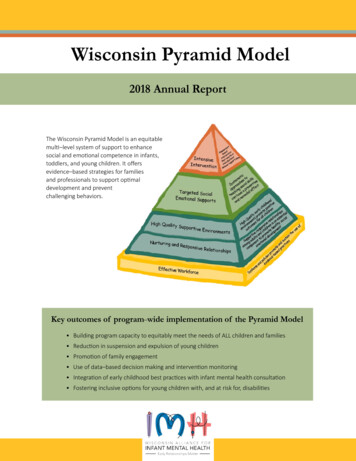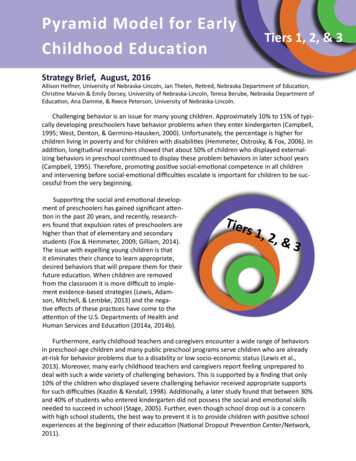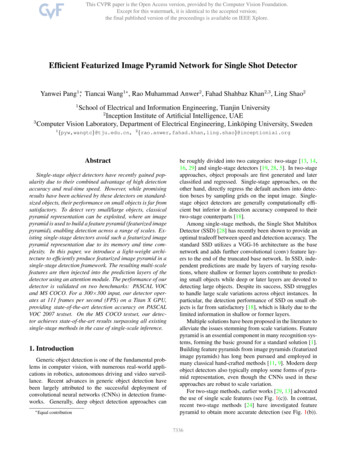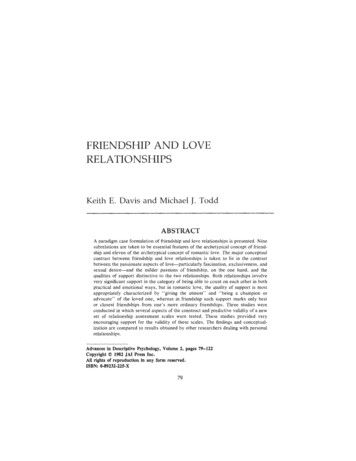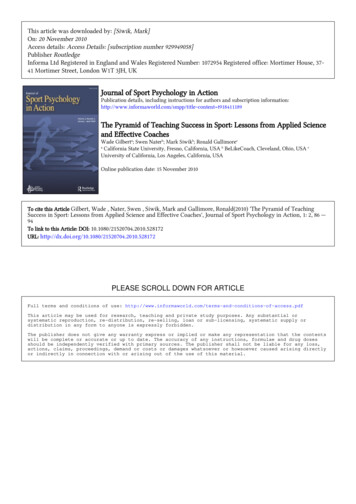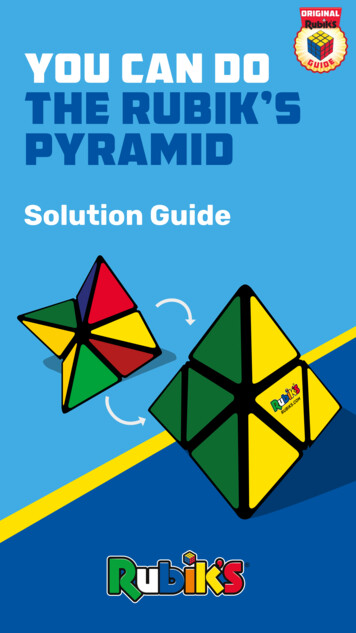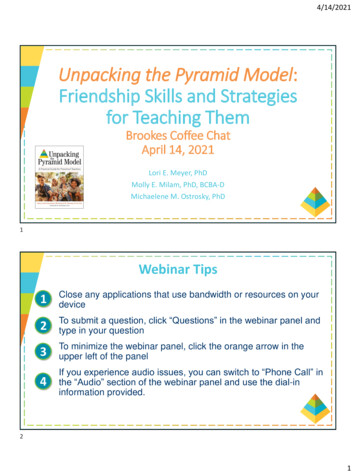
Transcription
4/14/2021Unpacking the Pyramid Model:Friendship Skills and Strategiesfor Teaching ThemBrookes Coffee ChatApril 14, 2021Lori E. Meyer, PhDMolly E. Milam, PhD, BCBA-DMichaelene M. Ostrosky, PhD1Webinar Tips1Close any applications that use bandwidth or resources on yourdevice2To submit a question, click “Questions” in the webinar panel andtype in your question3To minimize the webinar panel, click the orange arrow in theupper left of the panel4If you experience audio issues, you can switch to “Phone Call” inthe “Audio” section of the webinar panel and use the dial-ininformation provided.21
4/14/2021Unpacking the Pyramid Model:A Practical Guide for Preschool TeachersCreated by Pyramid Modeldevelopers and experts, this isthe first book to provide acomprehensive, step‐by‐stepoverview of the Pyramid Modelfor children ages 2–5.bpub.fyi/Unpacking-PM3Book GiveawayWe’re giving away a FREE copy ofUnpacking thePyramid ModelOne attendee will be selected at random and emailed after thewebinar. Submit your questions to increase your chances!42
4/14/2021CertificatesCertificates of attendanceare available for all webinarand recording viewers.More information will be provided at the endof the webinar.5IntroductionsLori MeyerMolly MilamMicki Ostrosky63
4/14/2021ObjectivesBy the end of today’s chat, you will be able to:1. Name two indicators for determining the presence of afriendship between young children;2. Describe class-wide, small group/partners, andindividualized teaching strategies and supports for teachingfriendship skills across daily routines & activities; and3. Describe steps for partnering with families to supportchildren’s development of friendships.7Pyramid Model for Promoting the Social andEmotional Competence of Young ChildrenTertiary InterventionFewSecondary PreventionSomeUniversal PromotionAllA Framework of Evidence-Based Practices84
4/14/20219Key Social Emotional Skills ChildrenNeed as They Enter School Confidence Capacity to develop good relationships with peersand adults Concentration and persistence on challenging tasks Ability to effectively communicate emotions Ability to listen to instructions and be attentive Ability to solve social problems105
4/14/2021Think about your best friend Why is he or she your best friend?What words describe him or her?11How Do We Know Friendships Exist?126
4/14/2021When Do Friendship Skills Develop?Age0 to 12monthsRelationships with Caregivers 18 to 24monthsShows more in objects than peers Begins to understand own nameDemonstrates strong feelings Shows interest in peers by observing them Explores environmentDemonstrates independence Prefers known individualsExpresses distress when separated fromcaregiverCan point or gaze to communicate requests Prefers caregivers to othersMay demonstrate separation anxietyBegins to play independentlyEngages in more complex verbal interactions Continues to observe peers closelyBegins to engage in parallel play Continues to display independenceExperiences mood swings Can play, share, and take turns with adultsupport Shows concern for othersUses names for self and others Interacts with peers often through play andconversation Begins to show emotional regulationLearning to label and describe emotions Forms preferred friendshipsSocially competent with peersPlays games with other children Can take turns in conversationsDevelops cooperation skillsDescribes emotionsCan problem solve and resolve conflict withadult support 24 to 36months36 to 48monthsSocial-Emotional Skills 12 to 18monthsRelationships with PeersRecognize voicesImitate caregiversExpress excitementMore refined crying Engages in independent playSeparates from caregivers with ease48 to 60 monthsAdapted from Barton, 201413What Can You Do Early On – to Promote theDevelopment of Friendship Skills? Encourage toddlers to help eachother and do routines together Provide positive verbal supportfor play between children Read books about friends,playing together, helping eachother, etc. Provide opportunities to practiceturn-taking and sharing147
4/14/2021Friendship Skills Gives suggestions (play organizers)Shares toys & other materialsTakes turns (reciprocity)Is helpful (assists)AffectionateGive complimentsUnderstands how & when to check-in andgive an apology Begins to empathize Responding to & maintaining initiations15When Should We Teach Friendship Skills?Remind child to usepreviously taughtskill/POSSIBLE toteach new skillTeachingnew skill canoccurRemind child to usepreviously taughtskill/do NOT teachnew skillConflict/challengingbehavior peaksChallenging Interaction16168
4/14/2021Teaching Friendship Skills: Class-wide ApproachesUniversal PromotionAll17Sample Lessons to Support Development ofFriendship Skills Friendship can: Put names in can, Friendship music/songschildren draw name, makewww.songsforteaching.comsomething special for a friend Movement partners Pair up to plant seeds offriendship and care for together Friendship “hands” tree Compliment links Friendship books Autograph book of friends “My friend” art (it takes two)189
4/14/2021Using Children’s Literature19Book NooksI Can ShareBy Karen KatzRainbow FishBy Marcus plementation/Program/strategies.html2010
4/14/2021Teaching Friendship Skills: Secondary Strategies& SupportsSecondary PreventionSome21Peer-mediated InterventionsAdultsTrainingSessionsPeer BuddiesTarget ChildrenPeer BuddyImplementation2211
4/14/2021Peer-mediated Interventions: s/Stay-Play-Talk.pdfMilam et al., 201823Teaching Friendship Skills: IndividualizedTeaching Strategies & SupportsTertiary InterventionFew2412
4/14/2021Scripted Stories – Super ls super-friendaward.pdf25Play ScriptsTable from Goldstein & Cisar, 19922613
4/14/2021Visuals – Initiating PlayStep 1I can tap my friendon the shoulder.Step 2I can say “let’s play!”Step 3I can gently take afriend by the hand.Step 4I can give my frienda toy that I want ivity Skills MatrixClass: Cheryl’sWeek: 1/22-1/27RoutineChild: AmyChild: ZaneArrival/TabletimeChecks in withfeeling chartSays Hello to peers Invites peer toplayCircletimeIdentifiesemotions in selfGreets peer duringGood Morning songFreeChoiceStays with peer for Chooses a friend to Invite peers to5 minplay withplaySnackOutsideChoose a friend tosit next toChild: TylerOffers to helpothersStays with peer for Chooses a friend to Invites peers to5 min.play withplay2814
4/14/2021Fostering Friendshipsthrough Family Partnerships Learn from families Which friends do their children talk about at home? Share with families Mention friendship moments that happen at school Help families promote friendship skill development athome Send book lists or books about friendship home (e.g.,a lending library) Share strategies for teaching friendship skills29Home-School Connections Backpack Connectionwww.challengingbehavior.org3015
4/14/2021Benefits of Having Friends Increase self esteem and self confidence Help you develop social skills Less disruptive/inappropriate behavior More positive attitudes about people withdisabilities Equal if not greater, developmental progress Contribute to quality of life Build our capacity to empathize31In Summary Close friendships are reciprocal, voluntary, and yieldmany benefits for young children’s social emotionaldevelopment and academic success Friendship skills help children form and maintainfriendships Friendship skills can be taught using a variety of materialsand strategies across daily routines and activities Partnering with families can help foster children’sfriendships: Learn from one another and share friendshipstories and strategies3216
4/14/2021Contact .eduMickiostrosky@illinois.edu33Questions?3417
4/14/2021CertificatesCertificates of attendance areavailable for download from the“Handouts” section of the webinarpanel or from the URL below:bpub.fyi/UPM-Friends-Cert35Webinar SurveyAt the end of the webinar, youwill be prompted to completea short survey.Let us know your thoughts about this webinarand you could win a free book!3618
4/14/2021Special OfferSAVE 20%at www.brookespublishing.comUse codeCOFFEE121*Expires 12/31/21. Not to be combined with any other discounts or offers. Consumer orders only, please.Excludes BOL training, pre-discounted bundles, and online products such as ASQ Online and AEPSinteractive.37Brookes Coffee ChatsLooking for more professionaldevelopment opportunities?bpub.fyi/Coffee-Chats3819
4/14/2021COVID-19 Resources Recommended reading Downloadable resources Professional developmentwebinarsbpub.fyi/COVID-EC39Thank You!4020
Unpacking the Pyramid Model: A Practical Guide for Preschool Teachers Created by Pyramid Model developers and experts, this is the first book to provide a comprehensive, step‐by‐step overview of the Pyramid Model for children ages 2-5. bpub.fyi/Unpacking-PM Book Giveaway We're giving away a FREE copy of Unpacking the Pyramid Model
